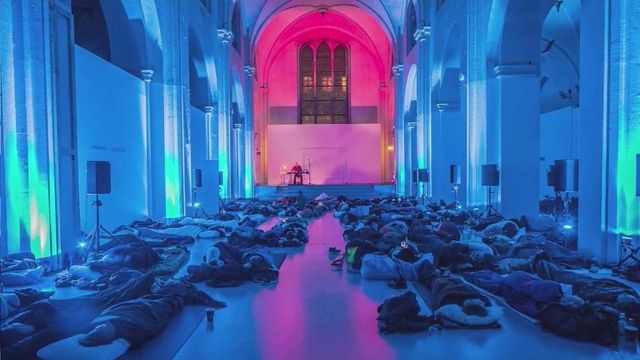Moogfest show puts fans to sleep, on purpose
Using a mix of pre-programmed drones, nature sounds and improvised accompaniment, Rich's concerts lull his audience into a slumber. Then, he gets creative.
Posted — UpdatedBefore the concert, Rich said his goal was to use music and lighting to “create an environment where sleep becomes strategically disrupted, where you can explore thoughts that happen in that state between asleep and awake.” Ideally, this allows audience members to enter “lucid dreaming,” where they can consciously explore their unconscious dreams and learn about their minds. “It’s better than drugs,” Rich added, “because you wake up refreshed.”
Rich, a composer of ambient music who is based in California, has been performing his sleep concerts since he was an undergraduate student at Stanford University in the early-1980s. It was an easier feat then, Rich admits, when his body and mind were younger. Now, Rich produces a sleep concert roughly once a year. His Durham performance was his first sleep concert in the United States since 2003.
A select few attendees were provided mattresses and pillows, while the rest of us made do with whatever we thought to bring. Some brave souls decided to spend the night on the concrete floor or propped up against a wood-paneled wall of the 21c hotel ballroom that would be our sleeping quarters and performance space. I came relatively prepared with a sleeping bag.
Looking around as I unrolled my bag, I wondered how difficult it would be to fall asleep in a room with 75 strangers. The prospect of multiple attendees putting on an impromptu snoring concert that overtook the main event was a particular worry. But it was a possibility Rich had dealt with before, and one he considered part of the experience. Snoring, he said, is fine. He told the audience to expect, at some point in the middle of the night, a neighbor to snore. If it happens, Rich instructed us, gently grasp the neighbor’s shoulder, which should encourage them to roll over. Thankfully, the attendees in my area were quiet sleepers.
As we laid down, the deep, loud bass note and cricket sounds pulsing out of the nearby speaker made me wonder if I would be able to sleep. The next thing I remember it was 1:30 a.m. and a change in the music has briefly roused me. I heard soft snoring from somewhere across the room, it almost fit with the quiet drones and slow, melodic hum leaking from the speakers placed around the perimeter of the room, as if Rich had consciously blended it into the mix. I fell back asleep almost immediately.
That cycle happened repeatedly during Rich’s performance. A small, barely perceptible change would stimulate my brain just enough to reset, before sleep set in again. The room felt timeless, governed more by new flourishes in Rich’s composition than seconds, minutes, and hours. If other attendees tossed and turned, coughed, or left the room, it was completely in tune with with the ambient music.
Though the audience of sleeping neighbors proved to be far less awkward than expected, the composer’s presence felt increasingly strange as the night progressed. At one point, just before 5:00 a.m., Rich brought the house lights up to almost full brightness, shocking us out of our sleep cycles. A few moments later, sure that we were adequately disrupted, he faded the white lights back down, leaving only the dim blue glow we started with. It was one of many times I remembered that Rich was watching me sleep, something that left me ill at ease. Moreover, it was a reminder that throughout the night I was having the personal and unguarded experience of sleep manipulated. He was benevolently, yet purposefully, steering our minds.
I woke remembering one dream far better than any others Rich had steered me into. My friends and their loved ones were at a mansion I somehow owned. Their children played in our swimming pool while we ate and laughed around a long oak table. None of us had seen each other in years and we were all so thrilled to have this reunion. Like with most dreams, the details matter far less than the way they made me feel. In this case, it was a sense of contentedness, a peaceful, pleasant state. I woke happy. For me, dreams typically feel like a random collage of callbacks from recent thoughts. This was different. It was worth chasing, and I closed my eyes again hoping the same dream would start again.
At 7:45 a.m., the shades in the 21c ballroom opened and morning light filled the room. Despite the uncomfortable concrete floor and frequently waking up, I felt well-rested and refreshed. Rich spoke in hushed tones, thanking his audience. We clapped in appreciation, but it was the tentative applause of a group of people still waking up, still trying to understand what happened to them the night before.
Copyright 2024 by Capitol Broadcasting Company. All rights reserved. This material may not be published, broadcast, rewritten or redistributed.






